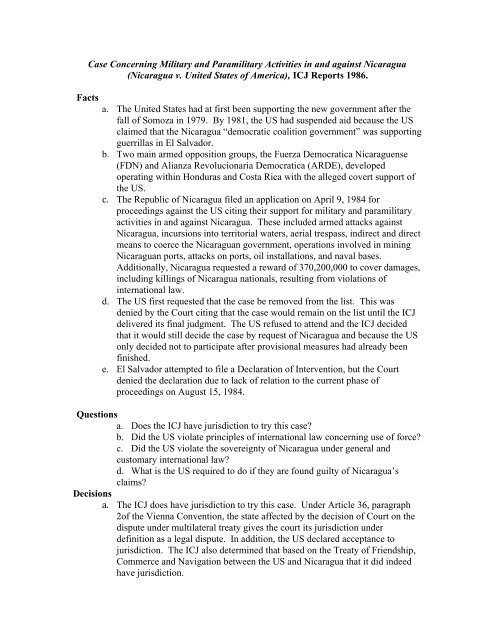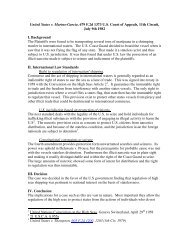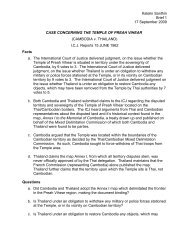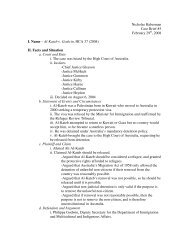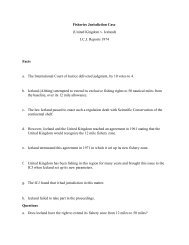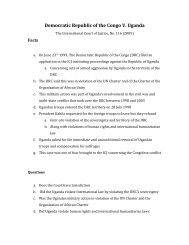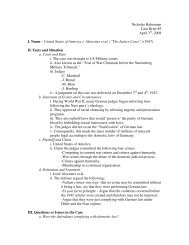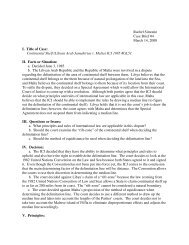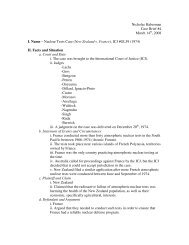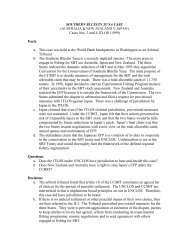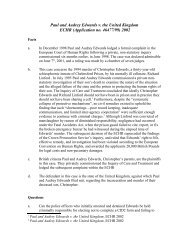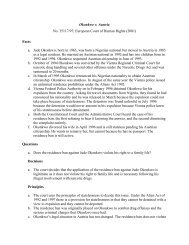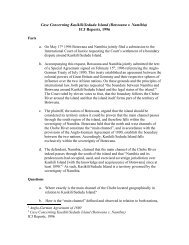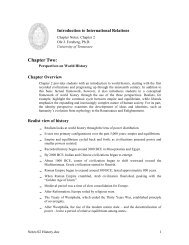Case Concerning Military and Paramilitary Activities in ... - Courses
Case Concerning Military and Paramilitary Activities in ... - Courses
Case Concerning Military and Paramilitary Activities in ... - Courses
You also want an ePaper? Increase the reach of your titles
YUMPU automatically turns print PDFs into web optimized ePapers that Google loves.
<strong>Case</strong> <strong>Concern<strong>in</strong>g</strong> <strong>Military</strong> <strong>and</strong> <strong>Paramilitary</strong> <strong>Activities</strong> <strong>in</strong> <strong>and</strong> aga<strong>in</strong>st Nicaragua<br />
(Nicaragua v. United States of America), ICJ Reports 1986.<br />
Facts<br />
a. The United States had at first been support<strong>in</strong>g the new government after the<br />
fall of Somoza <strong>in</strong> 1979. By 1981, the US had suspended aid because the US<br />
claimed that the Nicaragua “democratic coalition government” was support<strong>in</strong>g<br />
guerrillas <strong>in</strong> El Salvador.<br />
b. Two ma<strong>in</strong> armed opposition groups, the Fuerza Democratica Nicaraguense<br />
(FDN) <strong>and</strong> Alianza Revolucionaria Democratica (ARDE), developed<br />
operat<strong>in</strong>g with<strong>in</strong> Honduras <strong>and</strong> Costa Rica with the alleged covert support of<br />
the US.<br />
c. The Republic of Nicaragua filed an application on April 9, 1984 for<br />
proceed<strong>in</strong>gs aga<strong>in</strong>st the US cit<strong>in</strong>g their support for military <strong>and</strong> paramilitary<br />
activities <strong>in</strong> <strong>and</strong> aga<strong>in</strong>st Nicaragua. These <strong>in</strong>cluded armed attacks aga<strong>in</strong>st<br />
Nicaragua, <strong>in</strong>cursions <strong>in</strong>to territorial waters, aerial trespass, <strong>in</strong>direct <strong>and</strong> direct<br />
means to coerce the Nicaraguan government, operations <strong>in</strong>volved <strong>in</strong> m<strong>in</strong><strong>in</strong>g<br />
Nicaraguan ports, attacks on ports, oil <strong>in</strong>stallations, <strong>and</strong> naval bases.<br />
Additionally, Nicaragua requested a reward of 370,200,000 to cover damages,<br />
<strong>in</strong>clud<strong>in</strong>g kill<strong>in</strong>gs of Nicaragua nationals, result<strong>in</strong>g from violations of<br />
<strong>in</strong>ternational law.<br />
d. The US first requested that the case be removed from the list. This was<br />
denied by the Court cit<strong>in</strong>g that the case would rema<strong>in</strong> on the list until the ICJ<br />
delivered its f<strong>in</strong>al judgment. The US refused to attend <strong>and</strong> the ICJ decided<br />
that it would still decide the case by request of Nicaragua <strong>and</strong> because the US<br />
only decided not to participate after provisional measures had already been<br />
f<strong>in</strong>ished.<br />
e. El Salvador attempted to file a Declaration of Intervention, but the Court<br />
denied the declaration due to lack of relation to the current phase of<br />
proceed<strong>in</strong>gs on August 15, 1984.<br />
Questions<br />
a. Does the ICJ have jurisdiction to try this case<br />
b. Did the US violate pr<strong>in</strong>ciples of <strong>in</strong>ternational law concern<strong>in</strong>g use of force<br />
c. Did the US violate the sovereignty of Nicaragua under general <strong>and</strong><br />
customary <strong>in</strong>ternational law<br />
d. What is the US required to do if they are found guilty of Nicaragua’s<br />
claims<br />
Decisions<br />
a. The ICJ does have jurisdiction to try this case. Under Article 36, paragraph<br />
2of the Vienna Convention, the state affected by the decision of Court on the<br />
dispute under multilateral treaty gives the court its jurisdiction under<br />
def<strong>in</strong>ition as a legal dispute. In addition, the US declared acceptance to<br />
jurisdiction. The ICJ also determ<strong>in</strong>ed that based on the Treaty of Friendship,<br />
Commerce <strong>and</strong> Navigation between the US <strong>and</strong> Nicaragua that it did <strong>in</strong>deed<br />
have jurisdiction.
. The US <strong>in</strong>deed did violate use of force under <strong>in</strong>ternational law, as stipulated <strong>in</strong><br />
the UN Charter, Art. 2, para. 4, <strong>in</strong> addition to the General Assembly resolution<br />
2625, “Declaration on Pr<strong>in</strong>ciples of International Law concern<strong>in</strong>g Friendly<br />
Relations <strong>and</strong> Cooperation among States <strong>in</strong> Accordance with the Charter of<br />
the UN.” The US has violated <strong>in</strong>ternational law <strong>in</strong> its numerous attacks on<br />
Nicaraguan territory, <strong>in</strong>clud<strong>in</strong>g <strong>in</strong> Puerto S<strong>and</strong><strong>in</strong>o, Cor<strong>in</strong>to, Potosi Naval Base,<br />
San Juan del Sur, <strong>and</strong> on patrol boats between 1983-84, <strong>in</strong> addition to its<br />
support of the military <strong>and</strong> paramilitary forces, <strong>and</strong> lay<strong>in</strong>g of m<strong>in</strong>es <strong>in</strong> <strong>in</strong>ternal<br />
<strong>and</strong> territorial waters of Nicaragua. This violated the Hague Convention No.<br />
VIII which states that the lay<strong>in</strong>g of m<strong>in</strong>es <strong>in</strong> the <strong>in</strong>ternal waters of another<br />
State cannot be done without warn<strong>in</strong>g or notification, as it is also a violation<br />
of humanitarian law.<br />
c. The ICJ ruled that the US did jeopardize the right to sovereignty <strong>and</strong> political<br />
<strong>in</strong>dependence as stipulated by general <strong>and</strong> customary <strong>in</strong>ternational law. This<br />
especially considered the idea that States should not threaten the territorial<br />
<strong>in</strong>tegrity <strong>and</strong> political <strong>in</strong>dependence of any State, <strong>in</strong> addition to not<br />
<strong>in</strong>terven<strong>in</strong>g <strong>in</strong> another State’s domestic matters. The US violated this by<br />
tra<strong>in</strong><strong>in</strong>g, arm<strong>in</strong>g, equipp<strong>in</strong>g, f<strong>in</strong>anc<strong>in</strong>g, <strong>and</strong> support<strong>in</strong>g military <strong>and</strong><br />
paramilitary activities <strong>in</strong> <strong>and</strong> aga<strong>in</strong>st Nicaragua. Additionally, because the US<br />
directed <strong>and</strong> authorized flights <strong>in</strong> Nicaraguan territory for the purpose of<br />
<strong>in</strong>terfer<strong>in</strong>g with domestic affairs, Nicaragua’s sovereignty was aga<strong>in</strong> violated.<br />
This rul<strong>in</strong>g <strong>in</strong>vokes the pr<strong>in</strong>ciple of non-<strong>in</strong>tervention.<br />
d. The ICJ ruled that the US should immediately cease from restrict<strong>in</strong>g access to<br />
Nicaraguan ports <strong>and</strong> requested that they stop lay<strong>in</strong>g m<strong>in</strong>es <strong>and</strong> provide<br />
reparations to Nicaragua for all their breaches of customary <strong>in</strong>ternational law,<br />
<strong>and</strong> <strong>in</strong> violation of the Treaty of Friendship, Commerce <strong>and</strong> Navigation of<br />
1956. The requested payment by Nicaragua cannot be granted by the ICJ at<br />
this time, however, especially s<strong>in</strong>ce the US did not appear before the Court.<br />
Pr<strong>in</strong>ciples<br />
a. The key <strong>in</strong>ternational law pr<strong>in</strong>ciples <strong>in</strong> this case are sovereignty, political<br />
<strong>in</strong>dependence, humanitarian law <strong>and</strong> use of force.<br />
b. The ICJ used customary <strong>and</strong> <strong>in</strong>ternational to determ<strong>in</strong>e whether the US had been<br />
act<strong>in</strong>g <strong>in</strong> violation. Specifically, it cited the UN Charter <strong>and</strong> The Montevideo<br />
Convention on the Rights <strong>and</strong> Duties of States, the Charter of the Organization of<br />
American States, the Hague Convention VIII of 1907, <strong>and</strong> the Treaty of<br />
Friendship, Commerce <strong>and</strong> Navigation of 1956.<br />
Conclusion<br />
Cit<strong>in</strong>g numerous treaties <strong>and</strong> conventions govern<strong>in</strong>g <strong>in</strong>ternational law, after extensive<br />
analysis, the ICJ ruled that the US had acted <strong>in</strong> violation of the territorial sovereignty,<br />
political <strong>in</strong>dependence pr<strong>in</strong>ciples <strong>in</strong> addition to use of force <strong>and</strong> humanitarian law. These<br />
tenets of <strong>in</strong>ternational law have been violated result<strong>in</strong>g from US support to the Contra<br />
forces <strong>in</strong> numerous forms, plac<strong>in</strong>g m<strong>in</strong>es <strong>in</strong> the <strong>in</strong>ternal waters of Nicaragua, fly<strong>in</strong>g <strong>in</strong><br />
their airspace, <strong>and</strong> attacks on specific locations.
Bibliography<br />
<strong>Case</strong> <strong>Concern<strong>in</strong>g</strong> <strong>Military</strong> <strong>and</strong> <strong>Paramilitary</strong> <strong>Activities</strong> <strong>in</strong> <strong>and</strong> aga<strong>in</strong>st Nicaragua<br />
(Nicaragua v. United States of America), ICJ Reports 1986.<br />
1907. Hague Convention VIII. (18 October 1907).<br />
1933. Montevideo Convention on Rights <strong>and</strong> Duties of States (26 December 1933).<br />
1945. Charter of the United Nations (24 October 1945).<br />
1948. Charter on the Organization of American States (13 December 1951).<br />
1956. Treaty of Friendship, Commerce <strong>and</strong> Navigation (21 January 1956).<br />
Submitted<br />
Khara Boender, November 19, 2009


